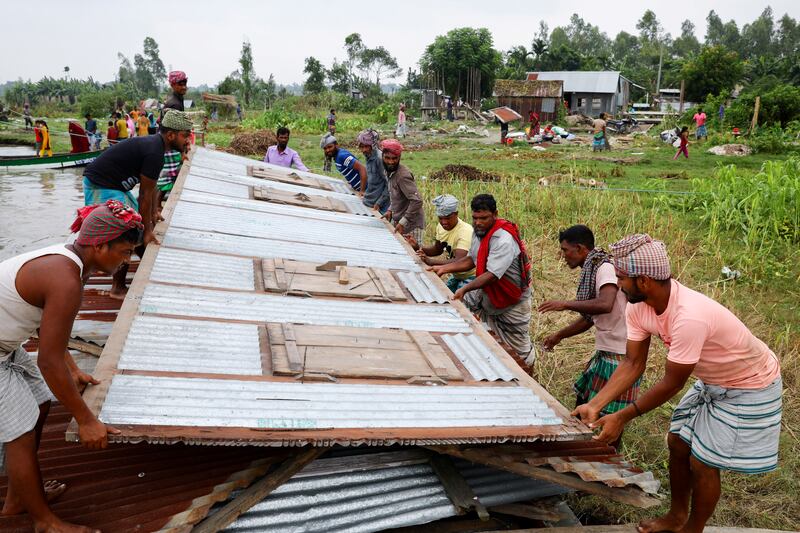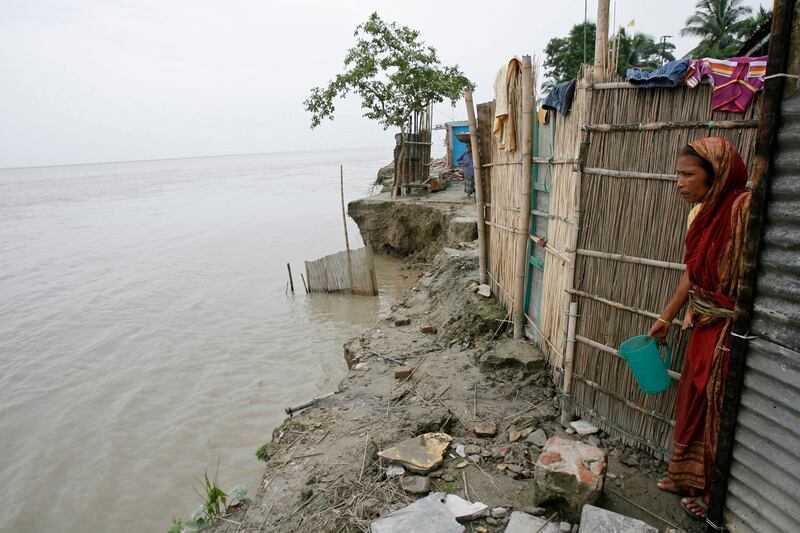Bangladesh, among countries most vulnerable to rising sea levels from warming temperatures, will soon unveil an ambitious plan for adapting to climate change, officials say, but the government may have trouble raising money for the U.S. $230 billion endeavor.
The National Adaptation Plan (NAP) proposes initiatives to make Bangladesh more resilient to impacts from a changing climate such as rising sea levels, increasing water salinity, severe flooding and river erosion.
Specific goals include saving 1.1 million hectares of land from flooding and storm surges, producing more 10 million tons of rice, protecting nearly 40 million fisheries-dependent families, and providing improved drainage facilities to 30 million of the urban population.
The plan will be sent to the cabinet for approval, said Mirza Shawkat Ali, of the Department of Environment.
“We hope the approval would come this month,” the director of the climate change cell at the department told BenarNews last week.
Bangladesh ranks 7th among the top 10 most affected countries (2000-2019) in terms of long-term climate risk, according to the 2021 Global Climate Risk Index published by Germanwatch, an NGO based in Bonn.
Over the last 40 years, economic loss due to climate change in Bangladesh was estimated at U.S. $12 billion, according to the NAP, which adds that the country could lose two percent of its annual gross domestic products by 2050 as fallout from global warming.
The NAP identified 11 climate stressors that will lead to 14 hazardous effects, namely – monsoon floods, flash floods, urban floods, sea level rise, drought, salinity, storm surges, excess heat, landslides, river erosion, lightning, excess rainfall, cold spells and ocean acidification.
Climate change has already started affecting Bangladesh.
Increasingly severe droughts have afflicted its northwestern districts. The southwestern region has seen six percent more super cyclones in the past 30 years. Sea levels are rising in the Bay of Bengal by 3 to 6 millimeters a year.
“Bangladesh is not a polluter, but a victim of climate change caused by the burning of fossil fuels by the developed and developing economies,” Ziaul Haque, a government negotiator at the United Nations climate change talks, told BenarNews.
“The developed countries must provide funds to victim countries like us,” said Haque, who is also a director at the Department of Environment.

One Bangladesh government official, however, acknowledged that mobilization of funds from developed countries may not be easy.
“Of the U.S. $230 billion, NAP targets spending nearly $185 billion for the water resources sector. But mobilizing even $18 billion would be tough to achieve,” Saber Hossain Chowdhury, chairman of the Parliamentary Standing Committee on Environment, Forest and Climate Change, told BenarNews.
“We have to prioritize and sync projects that would give benefits in more than one sector.”
But that is not as simple as it sounds, because consequences of climate change vary from region to region, said Syed Hafizur Rahman, a professor of environmental sciences at Jahangirnagar University in Dhaka.
“For instance, the southwestern part would face sea level rise and inundation of coastal land, while we may see land formation in Cox’s Bazar or Noakhali. In the northeastern region, we will see flash floods. We cannot find any one size-fits-all solution,” Rahman told BenarNews.

‘Financial system is plagued with corruption’
Another barrier to mobilizing international funds is Bangladesh’s poor record in transparency, accountability and timely project execution, some experts said.
“The flow of money from international sources will not come only through shouting that we are the worst-affected country, the seventh-most vulnerable country,” Mizan R. Khan, deputy director at NGO International Center for Climate Change and Development, told BenarNews.
“Rather, the money will come only if we ensure an accountable and transparent financial management in project execution. This means the developed countries would only provide funds when we can convince them that their contribution would not be misused.”
He cited the example of tiny neighbor Bhutan which, according to him, has got a sizable contribution for climate resilience projects because of its transparent financial mechanisms.
“But our financial system is plagued with corruption and non-transparency. This is one of the obstacles,” Khan said.
“If we can develop projects with transparent and accountable financial mechanisms, we will get enough funds from international sources. Funding will not be a problem for good projects.”
Chowdhury, of the parliamentary standing committee, said that another major problem in Bangladesh was that most projects get delayed and go over budget.
“At the standing committee, we have discussed NAP and suggested that the government must have a mid-term review so that the projects could be monitored properly. At the same time, we have to put in place some determinants coupled with a transparent process to assess the quality-based output of projects. We must follow it strictly,” he said.
“We have some success stories in implementing projects. Therefore, we have suggested that the government make a pool of project directors who implemented projects efficiently. From the pool, the government can appoint project directors,” Chowdhury said.
